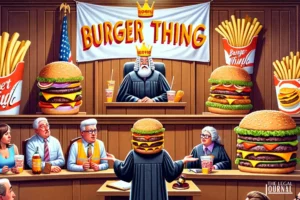In a legal battle that has garnered significant attention, coffee giant Starbucks finds itself at the center of a class-action lawsuit involving its popular Refresher fruit drinks. Claimants argue that these beverages, bearing names like “Mango Dragon fruit Lemonade” and “Strawberry Açaí Lemonade,” lack the very fruit ingredients they boast on their labels. As a legal professional dedicated to advocating for the rights of injured parties, I will explore the key points of this lawsuit, provide a neutral analysis, and delve into the implications for consumers and Starbucks alike.
Key Points:
- The heart of this lawsuit lies in the claim that Starbucks engaged in false and deceptive marketing practices regarding several of its Refresher drinks. Plaintiffs contend that consumers purchased these drinks with the expectation that they contained all the fruits clearly listed in their respective names.
- U.S. District Judge John Cronan has rejected Starbucks’ request to dismiss nine out of eleven claims in the class-action complaint. The judge’s decision is based on the belief that a significant portion of reasonable consumers would assume that these beverages indeed contained the fruit advertised in their names.
- Starbucks has vehemently denied the allegations, labeling them as “inaccurate” and “without merit.” The company argues that the fruits mentioned in the drink names are meant to describe flavors rather than specific ingredients.
- A critical point of contention is whether terms like “mango,” “passionfruit,” and “açaí” solely represent flavors or also indicate the presence of those actual ingredients. The judge’s rejection of Starbucks’ argument suggests that these terms typically imply the inclusion of the respective fruits.
- The plaintiffs seek damages exceeding $5 million. Their goal is not only to obtain financial compensation but also to achieve class certification, potentially impacting a larger group of consumers.
This lawsuit raises important questions about transparency in product labeling and marketing. While Starbucks contends that the fruit names merely denote flavor, the judge’s decision to allow the majority of the claims to proceed indicates a contrary viewpoint. The outcome of this case could set a precedent for how food and beverage companies label their products, emphasizing the need for clear and accurate representations.
From a legal perspective, it’s crucial to understand the burden of proof required for such claims. In this instance, the judge dismissed two allegations with prejudice, as the plaintiffs failed to provide sufficient evidence of intentional fraud and unjust enrichment. However, the remaining claims will proceed to trial, suggesting that there is a genuine legal dispute worth exploring further.
For consumers, this lawsuit underscores the importance of scrutinizing product labels and understanding the fine print. It serves as a reminder that marketing language, especially in the food and beverage industry, should be clear and honest to avoid potential confusion and disappointment among consumers.
Starbucks, as a well-known and respected brand, may face both financial and reputational consequences. The outcome of this case will not only determine the extent of damages but could also impact how consumers perceive the company’s commitment to transparency.
In conclusion, the Starbucks Refresher lawsuit serves as a reminder of the importance of clear and accurate product labeling. As this legal battle unfolds, it will be watched closely not only by legal professionals like Daniela but also by consumers concerned about the transparency of the products they purchase. It is a case that highlights the need for companies to align their marketing claims with the actual contents of their products, and it reaffirms the critical role of the legal system in protecting consumer rights and advocating for justice.









